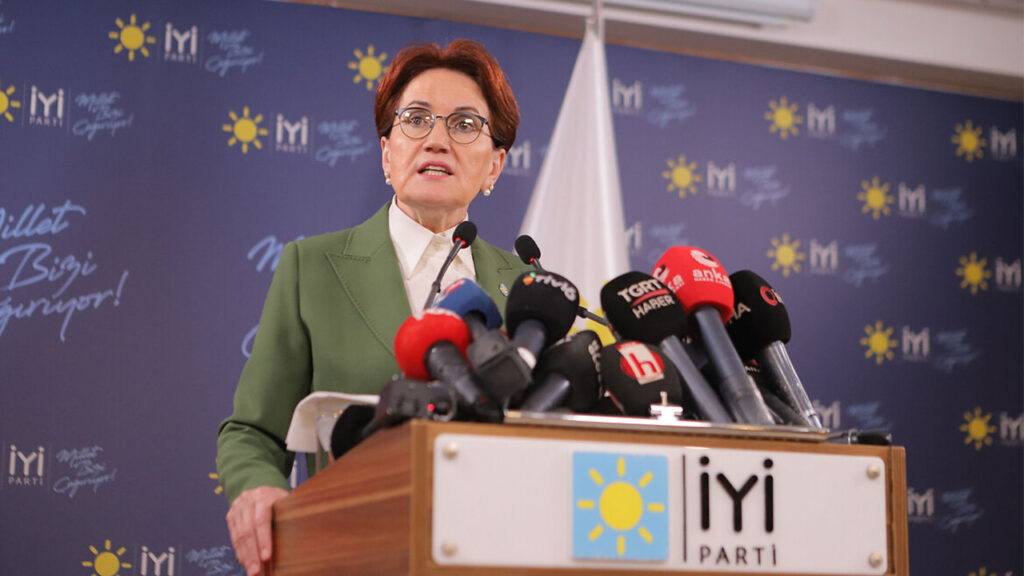The leader of a nationalist party that is part of an opposition alliance in Turkey is facing growing pressure for dialogue with the pro-Kurdish Peoples’ Democratic Party (HDP), securing the support of which is crucial for the bloc’s goal of ending President Recep Tayyip Erdoğan’s two-decade rule.
Meral Akşener, chair of the nationalist İYİ (Good) Party, one of the six parties in the opposition bloc known as the Nation Alliance, on Tuesday spoke during a program on Habertürk TV.
Akşener said that although representatives from the main opposition Republican People’s Party (CHP), the bloc’s member with the largest voter base, can have meetings with their counterparts from the HDP, they can’t make the pro-Kurdish party part of the alliance. The İYİ leader’s comments came after she had ruled out a possible alliance with the HDP in September.
Akşener’s firm stance on the issue drew criticism from both HDP members and opposition figures since the pro-Kurdish party is key to realizing the Nation Alliance’s main goal of removing Erdoğan and his Justice and Development Party (AKP) government from power.
The HDP played a crucial role in the victory of Ekrem İmamoğlu, the CHP’s mayoral candidate in İstanbul, against the candidate of Erdoğan’s AKP in the local elections of 2019.
Jailed Kurdish leader Selahattin Demirtaş, a former co-chair of the HDP, on Wednesday posted an “open letter” addressed to Akşener on Twitter, asking her questions regarding her stance on the opposition bloc’s possible dialogue with the HDP.
İYİ Parti Genel Başkanı Sayın Meral Akşener'e açık mektubum. pic.twitter.com/Pft295UtnT
— Selahattin Demirtaş (@hdpdemirtas) March 8, 2023
“Our HDP, just like the İYİ Party, derives its legitimacy from the people. Moreover, the public showed more interest in the HDP than in your party, making the HDP the third party in Turkey,” Demirtaş told Akşener.
The jailed leader asked Akşener why it was that while the “politics of negotiation” is a right for the İYİ Party but not for the HDP, adding that if the HDP decides to support the opposition bloc, its candidate, CHP leader Kemal Kılıçdaroğlu, would very likely be the president of Turkey and Akşener the vice president.
“Do you want my vote as an HDP member? How do you intend to convince me, since you [as the İYİ Party] will sit in the seats of the vice president and ministers with my vote?” Demirtaş said.
World-famous Turkish pianist and composer Fazıl Say also criticized Akşener and called on her to abandon her attitude that “puts a barrier in front of Turkey, its youth, its future and its unity.”
Dinleyin Meral hanım,@meral_aksener @fatihaltayli pic.twitter.com/J4kuXR1OO5
— Fazıl Say (@fazilsaymusic) March 7, 2023
Say added that the HDP, like the İYİ Party, has millions of supporters and that refusing to hear their demands would be “inhumane.”
In addition to the AKP and its ultranationalist election partner, the Nationalist Movement Party (MHP), the İYİ Party also accuses the HDP of having links to the outlawed Kurdistan Workers’ Party (PKK).
The PKK, recognized as a terrorist organization by Turkey and much of the international community, has been waging a bloody campaign in Turkey’s Southeast since 1984.
The HDP, which denies any links to the PKK, has also repeatedly criticized the CHP and its ally, İYİ, for their stance on Kurds’ rights and efforts to distance themselves from the pro-Kurdish party amid a crackdown on its members that accelerated after 2016.

